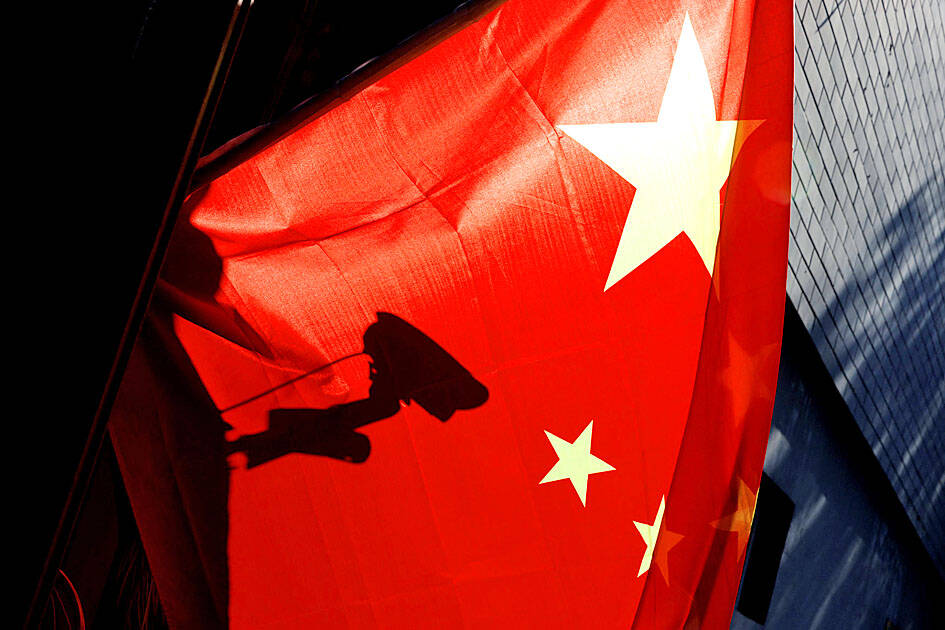Legislators across party lines have proposed amendments to the National Security Act (國家安全法) to prevent potential Chinese infiltration and safeguard the nation’s democratic system.
Democratic Progressive Party (DPP) lawmakers, including Chuang Jui-hsiung (莊瑞雄), Chen Kuan-ting (陳冠廷) and Wang Mei-hui (王美惠), yesterday submitted draft revisions to Paragraph 1, Article 13 of the act intended to reinforce the loyalty of the military, educators and civil servants.
The draft called for establishing security measures, effective immediately, to shore up perceived loopholes in legislation regarding national security.

Photo: Reuters
According to the draft, if military personnel, educators, civil servants or employees of agencies handling sensitive or classified information are suspected of contravening, or abetting others to contravene, Article 2 or Paragraph 1, Article 3 of the act in a way deemed harmful to national security, their agencies would be required to report the situation and, upon approval, suspend the people concerned while conducting investigations.
In serious or time-sensitive cases, the organization, agency or unit should suspend the people immediately and submit a report to their superiors within three days, the draft says.
Although existing laws impose penalties for acts that harm national security, there are no provisions to address cases in which actions could endanger national security without producing immediate or observable effects, Chuang said.
The amendment introduces preventive measures, such as suspension from duty, to mitigate risks posed by potential actions that could seriously harm national security, he said.
The draft passed its first reading and has been referred to the Legislative Yuan’s Foreign Affairs and National Defense Committee for further review.
Separately, Chinese Nationalist Party (KMT) lawmakers Wu Tsung-hsien (吳宗憲), Huang Chien-hao (黃健豪), Niu Hsu-ting (牛煦庭) and Liao Wei-hsiang (廖偉翔) have proposed amendments to articles 32, 33 and 34 of the Classified National Security Information Protection Act (國家機密保護法).
Those found guilty of leaking or disclosing classified information to people from China, Hong Kong, Macau or to enemy states or their agents would face increased penalties under the proposed revisions, Wu said.
The draft would raise the maximum prison sentence to 12 years, up from the current maximum of 10, while those who unintentionally break the law would face up to three years in prison and a fine of up to NT$500,000, according to the amendments.
The law must clearly define “foreign forces” and “acts of intervention” to prevent people from inadvertently breaking the law when engaging in routine cross-strait interactions or expressing political views, Wu said.
People who breach the law should incur administrative penalties rather than harsher criminal sentences, he said, adding that the ruling party should establish a cross-party oversight mechanism to prevent “selective enforcement.”
Wu also urged the government to ensure proper enforcement of the act, saying that the National Security Act should be used to protect the nation’s security, adding that it should not be used to punish political adversaries.

CHAOS: Iranians took to the streets playing celebratory music after reports of Khamenei’s death on Saturday, while mourners also gathered in Tehran yesterday Iranian Supreme Leader Ayatollah Ali Khamenei was killed in a major attack on Iran launched by Israel and the US, throwing the future of the Islamic republic into doubt and raising the risk of regional instability. Iranian state television and the state-run IRNA news agency announced the 86-year-old’s death early yesterday. US President Donald Trump said it gave Iranians their “greatest chance” to “take back” their country. The announcements came after a joint US and Israeli aerial bombardment that targeted Iranian military and governmental sites. Trump said the “heavy and pinpoint bombing” would continue through the week or as long

TRUST: The KMT said it respected the US’ timing and considerations, and hoped it would continue to honor its commitments to helping Taiwan bolster its defenses and deterrence US President Donald Trump is delaying a multibillion-dollar arms sale to Taiwan to ensure his visit to Beijing is successful, a New York Times report said. The weapons sales package has stalled in the US Department of State, the report said, citing US officials it did not identify. The White House has told agencies not to push forward ahead of Trump’s meeting with Chinese President Xi Jinping (習近平), it said. The two last month held a phone call to discuss trade and geopolitical flashpoints ahead of the summit. Xi raised the Taiwan issue and urged the US to handle arms sales to

A magnitude 5.6 earthquake struck off the coast of Yilan County at 12:37pm today, with clear shaking felt across much of northern Taiwan. There were no immediate reports of damage. The epicenter of the quake was 16.9km east-southeast of Yilan County Hall offshore at a depth of 66.8km, Central Weather Administration (CWA) data showed. The maximum intensity registered at a 4 in Yilan County’s Nanao Township (南澳) on Taiwan’s seven-tier scale. Other parts of Yilan, as well as certain areas of Hualien County, Taipei, New Taipei City, Taoyuan, Hsinchu County, Taichung and Miaoli County, recorded intensities of 3. Residents of Yilan County and Taipei received

Taiwan has secured another breakthrough in fruit exports, with jujubes, dragon fruit and lychees approved for shipment to the EU, the Ministry of Agriculture said yesterday. The Animal and Plant Health Inspection Agency on Thursday received formal notification of the approval from the EU, the ministry said, adding that the decision was expected to expand Taiwanese fruit producers’ access to high-end European markets. Taiwan exported 126 tonnes of lychees last year, valued at US$1.48 million, with Japan accounting for 102 tonnes. Other export destinations included New Zealand, Hong Kong, the US and Australia, ministry data showed. Jujube exports totaled 103 tonnes, valued at